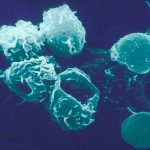Link to Pubmed [PMID] – 14665694
Proc. Natl. Acad. Sci. U.S.A. 2003 Dec;100(26):15800-5
In most cells, the NF-kappaB transcription factor is sequestered in the cytoplasm by interaction with inhibitory proteins, the IkappaBs. Here, we show that combined IkappaBalpha/IkappaBepsilon deficiency in mice leads to neonatal death, elevated kappaB binding activity, overexpression of NF-kappaB target genes, and disruption of lymphocyte production. In IkappaBalpha/IkappaBepsilon-deficient fetuses, B220+IgM+ B cells and single-positive T cells die by apoptosis. In adults, IkappaBalpha-/-IkappaBepsilon-/- reconstituted chimeras exhibit a nearly complete absence of T and B cells that is not rescued by cotransfer with wild-type bone marrow. These findings demonstrate that IkappaBs tightly control NF-kappaB activity in vivo and that increased NF-kappaB activity intrinsically impairs lymphocyte survival. Because reduction or rise of NF-kappaB activity leads to similar dysfunction, they also reveal that only a narrow window of NF-kappaB activity is tolerated by lymphocytes.




